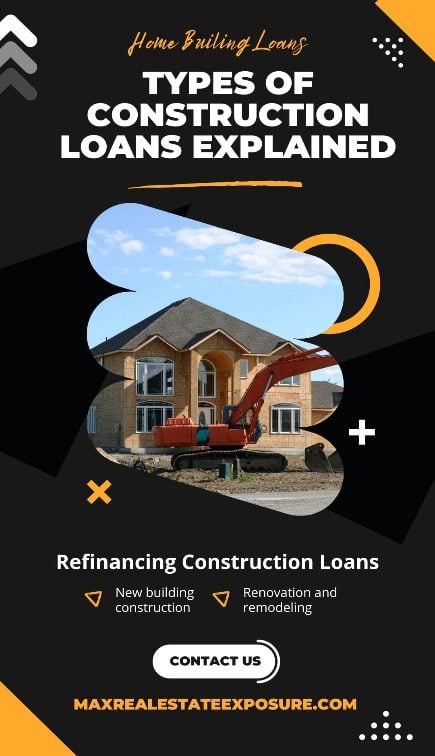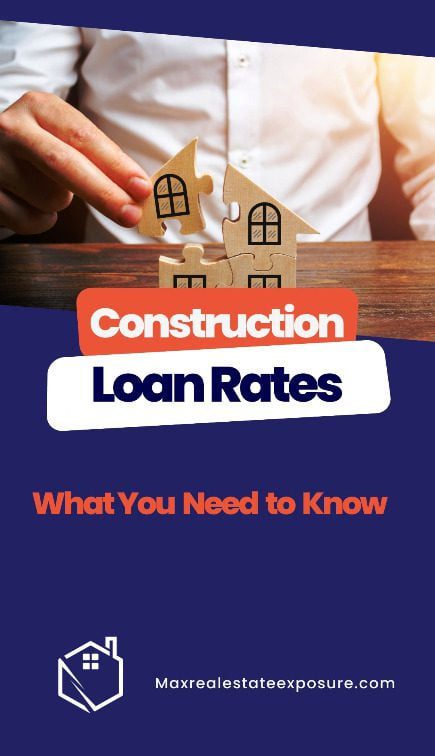 Are you wondering if you should refinance your construction loan? The answer is likely yes.
Are you wondering if you should refinance your construction loan? The answer is likely yes.
Construction loans can offer financial support during the building process, but refinancing can provide long-term benefits. By refinancing a construction loan, homeowners can secure a lower interest rate for their permanent mortgage and potentially save money over time.
Refinancing also allows for adjustments to loan terms based on individual needs, such as switching from an adjustable to a fixed interest rate. Understanding the process and requirements of refinancing a construction loan is crucial when considering this financial option.
From experience of custom building two homes I’ve owned, construction loans are an excellent financing option. However, refinancing a building loan will be something you need to consider depending on the type of loan program you choose.
It is also essential to note that a land loan will be a better option if you don’t plan on building a home immediately.
What is a Construction Loan?
A construction loan is a specialized type of financing that provides funds for constructing a new home or property. It serves as a short-term loan to cover the expenses associated with building, including materials, labor, and permits.
Exploring the Purpose and Benefits of Construction Loans
The purpose of a construction loan is to facilitate the construction process by providing the necessary funds. This type of loan offers several benefits:
- Flexibility: Construction loans provide flexibility in disbursing funds, allowing borrowers to pay contractors and suppliers as needed.
- Lower Interest Rates: Construction loans typically have lower interest rates during construction than permanent mortgage loans.
- Payment Structure: During construction, borrowers only make interest payments on the amount disbursed rather than paying the principal amount.
Differentiating Between Construction-Only Loans and Construction-to-Permanent Loans
There are two main types of construction loans: construction-only loans and construction-to-permanent loans.
- Construction-only loans: These loans provide funds for the construction phase and must be paid or refinanced once construction is complete.
- Construction-to-permanent loans: These loans cover both the construction phase and the permanent mortgage loan, eliminating the need for separate financing. Once construction is complete, the loan seamlessly transitions into a traditional mortgage. You don’t need to refinance with a construction loan when it coverts to a conventional mortgage.
Eligibility Criteria for Construction Loans
To qualify for a construction loan, borrowers must meet certain eligibility criteria set by lenders. While specific requirements may vary, typical eligibility criteria include:
- Good Credit: A solid credit history and a good credit score are crucial for obtaining a construction loan. Borrowers should understand what constitutes a good credit score when buying a house.
- Financial Stability: Lenders assess borrowers’ financial stability, including income, assets, and debt-to-income ratio.
- Construction Plans and Budget: Borrowers need to provide detailed construction plans, cost estimates, and a budget for the project. The cost of building a house can vary depending on numerous factors. New construction lenders want to know how the house will be built, including specifications.
- Experience: Lenders may prefer borrowers with prior experience in construction or working with contractors.
- Collateral: The property being constructed serves as collateral for the construction loan.
Meeting these eligibility criteria increases the chances of loan approval and paves the way for a successful construction project.
How Do Construction Loans Work?
A construction loan is a specialized type of financing that provides funds to cover the costs of building a new home or renovating an existing property. Understanding how construction loans work is essential for homeowners embarking on building projects.
We will explore the basics of construction loans, the draw schedule for disbursing funds, and the critical differences between construction loans and mortgage loans.
Understanding the Basics of Construction Loans
Construction loans are typically short-term loans that provide funding for the construction phase of a property. These loans differ from traditional mortgage loans when buying new homes. They are specifically tailored for building or renovating homes.
During the construction period, borrowers may only need to pay interest on the loan balance rather than fully amortized mortgage payments. Once the construction is complete, the loan can be refinanced into a permanent mortgage.
The Draw Schedule: How Funds are Disbursed
A crucial aspect of construction loans is the draw schedule, which determines how and when funds are disbursed during the construction process. Lenders often conduct inspections at different stages of construction to ensure that the work is progressing as planned.
As each phase is completed, the lender releases a portion of the funds, known as a draw. Builders or contractors can then access these funds to cover material costs, labor, and other expenses related to the construction project.
Whether you are building a cheap house or a mansion, the lender wants to have a disbursement schedule.
Construction Loan vs. Mortgage Loan: Key Differences
It’s important to differentiate between construction loans and traditional mortgage loans. At the same time, mortgage loans purchase already-built homes, and construction loans finance building or renovating properties. Construction loans often have higher interest rates and shorter terms than mortgage loans.
Additionally, mortgage loans require a larger down payment, typically around 20% of the home’s value, while construction loans may require a smaller down payment during construction.
Types of Construction Loans
 Several types of loans suit different needs when financing a construction project. Understanding the other options can help homeowners make an informed decision.
Several types of loans suit different needs when financing a construction project. Understanding the other options can help homeowners make an informed decision.
Let’s explore the three common types of construction loans:
Construction-to-Permanent Loans
Construction-to-permanent loans, or C2P loans, are popular for those looking to build a new home.
These loans provide financing for both the construction phase and the permanent mortgage.
With a construction-to-permanent loan, borrowers only need to go through the approval process once, simplifying the overall financing process. Once the construction is complete, the loan transitions into a traditional mortgage with regular monthly payments.
Renovation Loans
Renovation loans, as the name suggests, are designed for homeowners who want to renovate or significantly improve an existing property. These loans can finance various projects, such as kitchen remodels, bathroom upgrades, or room additions.
Renovation loans often have more flexible eligibility criteria and allow homeowners to borrow based on the property’s future value after the renovations. This can be an excellent option for those looking to enhance the value and livability of their current home.
Government-Backed Loans for Construction Projects
The government offers various loan programs to support construction projects, primarily aimed at promoting affordable housing initiatives or assisting first-time homebuyers.
Building loans may have specific eligibility requirements and are typically insured or guaranteed by government agencies such as the Federal Housing Administration (FHA) or the Department of Veterans Affairs (VA).
These loans often provide favorable terms and access to lower interest rates, making them an attractive option for those who qualify.
When considering the various types of construction loans, it’s essential to assess individual needs, project requirements, and eligibility criteria.
Consulting with a reputable lender or mortgage professional can guide you in choosing the most suitable loan option for your construction project.
Construction Loan Requirements
When seeking a construction loan, there are several requirements that borrowers need to fulfill. These requirements ensure that the lender is taking a calculated risk and that the borrower is financially capable of undertaking the construction project.
The following are critical considerations for construction loan requirements:
Credit Score and Debt-to-Income Ratio Considerations
One of the primary factors lenders assess is the borrower’s credit score. A higher credit score demonstrates a history of responsible financial behavior and increases the likelihood of loan approval. Lenders typically look for a credit score above 680 for construction loan applicants.
In addition to credit score, lenders consider the borrower’s debt-to-income (DTI) ratio. This ratio compares the borrower’s monthly debt payments to their gross monthly income.
Most lenders prefer a DTI ratio below 45%, ensuring the borrower has sufficient income to manage construction loan payments and other financial obligations.
Documentation and Financial Records Needed for Approval
To secure approval for a construction loan, borrowers must provide comprehensive documentation and financial records. These typically include:
- Income verification, such as tax returns, W-2 statements, and recent pay stubs
- Bank statements for at least three to six months
- Personal financial statements
- A detailed construction plan, including cost estimates from a qualified contractor
- Proof of legal ownership of the land or building plot
By submitting these documents, borrowers can demonstrate their financial stability and the feasibility of the construction project, increasing the chances of loan approval.
Collateral and Appraisal Requirements for Construction Loans
Collateral plays a crucial role in construction loans as it provides security for the lender in case of default. Typically, the collateral for a construction loan is the property under construction. However, lenders may also request additional collateral, such as other real estate properties or personal assets, to mitigate their risk.
Furthermore, lenders require a property appraisal to determine its current value and potential after construction. This appraisal ensures that the loan amount aligns with the property’s market value and protects both the lender and the borrower.
Meeting these collateral and appraisal requirements reassures lenders that their investment is protected, allowing borrowers to proceed with their construction loan applications.
Construction Loan Rates
 Construction loan rates play a significant role in determining the overall cost of financing your construction project. Understanding the factors affecting these rates and the difference between fixed and adjustable interest rates can help you secure the best terms for your construction loan.
Construction loan rates play a significant role in determining the overall cost of financing your construction project. Understanding the factors affecting these rates and the difference between fixed and adjustable interest rates can help you secure the best terms for your construction loan.
When you don’t have the best financing terms during the building of your home, you’ll want to refinance your construction loan.
Factors Affecting Construction Loan Interest Rates
Several key factors influence the interest rates of construction loans:
- Current market conditions: Construction loan rates are sensitive to changes in the broader economy, including inflation, employment rates, and the Federal Reserve’s monetary policies.
- Borrower’s creditworthiness: Lenders consider the borrower’s credit score, credit history, and debt-to-income ratio when setting construction loan rates. A higher credit score and lower debt-to-income ratio generally result in more favorable rates.
- Loan-to-value (LTV) ratio: The LTV ratio is the percentage of the loan amount compared to the appraised value of the property. Lenders typically offer more competitive rates for lower LTV ratios.
- Loan size and term: Larger loan amounts or longer repayment terms may come with slightly higher interest rates.
- Down payment: A larger down payment upfront can potentially lower the interest rate on a construction loan.
Fixed vs. Adjustable Interest Rates for Construction Loans
When selecting a construction loan, borrowers must decide between fixed and adjustable interest rates:
- Fixed interest rates: With a fixed rate, the interest remains the same throughout the loan term, providing predictability and stability in monthly payments. This option is ideal for those who prefer a consistent budget.
- Adjustable interest rates: Adjustable-rate mortgages offer an initial fixed period followed by periodic adjustments based on market conditions. While the initial rate may be lower, it can fluctuate over time, potentially leading to higher payments. Many who have adjustable rates will refinance their construction loan into a fixed program end loan.
Steps to Secure the Best Construction Loan Rates
To ensure you obtain the most favorable construction loan rates possible, consider the following steps:
- Research multiple lenders: Take the time to compare loan offerings from different mortgage lenders, considering their rates, fees, and overall reputation. Choosing a mortgage lender is crucial for construction loans.
- Improve your creditworthiness: Prioritize improving your credit score and reducing your debt-to-income ratio to enhance your chances of securing lower interest rates.
- Save for a larger down payment: Increasing your down payment can help reduce the overall loan amount and qualify you for better rates.
- Get pre-approved: Obtaining mortgage pre-approval from a lender demonstrates your creditworthiness and can strengthen your negotiation position when discussing rates.
- Consult with a construction loan specialist: Working with a knowledgeable professional can help you navigate the loan process efficiently and increase your chances of securing desirable rates.
By understanding the factors influencing construction loan rates and following the necessary steps, you can optimize your chances of securing the best rates for your construction project.
How To Get A Construction Loan
When it comes to obtaining a construction loan, there are several essential steps you need to follow. From finding the right lender to preparing the necessary financials and documentation, here’s a breakdown of how to get a construction loan in the US.
Finding the Right Construction Loan Lender
The first step in securing a construction loan is to find the right lender specializing in this financing type. Look for lenders with experience in construction loans who can provide competitive interest rates and favorable terms.
Steps to Apply for a Construction Loan
Once you have identified a suitable lender, the next step is to begin the application process. This typically involves the following steps:
- Complete the loan application: Provide all the information and documentation requested by the lender.
- Submit your construction plans: Include detailed plans and specifications of the construction project, along with cost estimates.
- Provide financial information: This includes your income, assets, debts, and credit history.
- Obtain pre-approval: If your application is approved, you will receive a pre-approval letter indicating the loan amount you qualify for.
- Finalize the loan terms: Work with the lender to determine the loan amount, interest rate, and repayment terms best suit your needs.
Preparing Your Financials and Required Documentation
Before applying for a construction loan, gathering and organizing your financials and required documentation is essential. This typically includes:
- Proof of income: Provide pay stubs, tax returns, and other relevant income documentation.
- Asset verification: Gather evidence of your assets, such as bank and investment account statements.
- Credit history: Obtain a copy of your credit report and address any issues that may negatively impact your loan application.
- Construction plans and estimates: Present detailed plans, construction contracts, and cost estimates for the project.
- Legal documents: Prepare necessary documents, such as property deeds or contracts.
Construction Loan FAQs
Here are some frequently asked questions about construction loans:
Can You Use a Construction Loan to Renovate an Existing Home?
Yes, you can use a construction loan to finance renovations on an existing home. These loans can provide the necessary funds to upgrade and improve your property, whether a minor remodel or a major renovation project.
What Happens if the Construction Project Goes Over Budget?
If your construction project goes over budget, it can create financial challenges. However, there are options available to help manage this situation. You may need to reassess your budget, explore cost-saving alternatives, or consider additional financing options.
Communicating with your lender and construction team is essential to address any budgetary issues promptly.
Can You Refinance a Construction Loan to Get Better Terms?
Yes, refinancing a construction loan is a viable option to secure better terms for your mortgage. Once your construction is complete, you can apply for a new loan to repay the existing construction loan.
By refinancing, you can potentially obtain a lower interest rate, adjust loan terms, or switch from an adjustable rate to a fixed-rate mortgage, depending on your financial goals and circumstances.
Understanding the ins and outs of construction loans is crucial when considering financing options for home renovations or new construction projects.
Take the time to gather all the necessary information and consult with experts to make informed decisions that align with your financial objectives.
Final Thoughts on Construction Loan Refinancing
Refinancing your construction loan is an excellent move to get the best terms and conditions. You’ll want to ensure during your time of homeownership, you have a competitive rate. What you ultimately pay for a home is primarily determined by the terms of your loan.
Before your home is finished, shop for the best mortgage interest rates on permanent loans.
About the Author: The above Real Estate information about refinancing a construction loan was provided by Bill Gassett, a Nationally recognized leader in his field. Bill has expertise in mortgages, financing, moving, home improvement, and general real estate.
Learn more about Bill Gassett and the publications he has been featured in. Bill can be reached via email at billgassett@remaxexec.com or by phone at 508-625-0191. Bill has helped people move in and out of Metrowest towns for the last 37+ years.
Are you thinking of selling your home? I am passionate about real estate and love sharing my marketing expertise!
I service Real Estate Sales in the following Metrowest MA towns: Ashland, Bellingham, Douglas, Framingham, Franklin, Grafton, Holliston, Hopkinton, Hopedale, Medway, Mendon, Milford, Millbury, Millville, Natick, Northborough, Northbridge, Shrewsbury, Southborough, Sutton, Wayland, Westborough, Whitinsville, Worcester, Upton, and Uxbridge MA.

